Accepted notions of demographics in the United States often contend that Latinos have traditionally been confined to the Southwest and urban centers of the East Coast, but Latinos have been living in the Midwest since the late nineteenth century. Their presence has rarely been documented and studied, in spite of their widespread participation in the industrial development of the Midwest, its communications infrastructure and labor movements. The populations of Puerto Rican, Mexican, Cuban and other Hispanic origins living in the region have often been seen as removed not only from mainstream America but also from the movements for human and civil rights that dominated Latino public discourse in the Southwest and Northeast during the 1960s and 1970s.
In the first text examining Latinos in this region, historians and social science scholars have come together to document and evaluate the efforts and progress toward social justice. Distinguished scholars examine such diverse topics as advocacy efforts, civil rights and community organizations, Latina Civil Rights efforts, ethnic diversity and political identity, effects of legislation for Homeland Security, and political empowerment.
- Cover
- Title page
- Copyright page
- Contents
- Foreword
- Introduction. La Causa: Civil Rights and Struggles for Equality in the Midwest. Gilberto Cárdenas
- Latinos in the Midwest: Civil Rights and Community Organization. Ricardo Parra
- The emergence of latinos in the midwest
- Latino organizations
- Sociedades Mexicanas
- Midwest Council of La Raza
- La Raza Unida
- Labor and Civil Rights Organizations
- Youth Organizations
- State Commissions
- Civic and Improvement Associations
- Civil Rights Organizations and Agencies
- Research Efforts
- Chicago's Latino community
- Latino influence in Chicago
- Notes
- Latinosand the Growth of Political Empowerment in Illinois. Patricia Mendoza
- From La Lucha to Latino: Ethnic Change, Political Identity, and Civil Rights in Chicago. David A. Badillo
- Chicago’s Mexican-American and Puerto Rican Communities before 1965
- La lucha and Division Street: Beyond 1960s Radicalism
- Urban Coalitions in the 1980s
- Barrios and the Contemporary Metropolis
- A Puerto Rican Perspective on Latino Chicago
- Notes
- The Latino Institute: Promoting Latino Progress through Policy Analysis, Leadership Development and Advocacy. Sylvia Puente ; Víctor Ortiz
- The Creation of a Latino Identity
- Strategies For Progress
- Highlights Of Accomplishments
- Education
- Political Empowerment and Redistricting
- Immigration
- Leadership Development
- Research and Data Analysis
- Latinas
- Latino Urban Policy Agenda
- Public Policy and Advocacy
- Civic Participation and Interethnic Relationships
- Conclusion
- Notes
- In Search of Meaningful Voice and Place: The IPO and Latino Community Empowerment in Chicago. María de los Ángeles Torres
- I. The Dilemma
- II. The Historical Setting: Politics, Race and Ethnicity
- III. Latinos
- IV. Finding Voice in the Electoral Arena: Independent Political Organization of Little Village
- Growth in Latino Concentration for Little Village, Pilsen and New City: 1990–2000
- History
- Electoral Growth
- Dilemmas
- Strategies/Innovations
- V. Rethinking Latino Civil Rights Struggles
- 1. The Geography of Latino politics need not be bound by either nation-al or local political districts.
- 2. More than one path to incorporation
- 3. Culture and Politics
- 4. Traditional notions of citizenship need to be reexamined
- 5. How to envision a broader social dynamic
- 6. Leadership
- The National Context
- Notes
- Civil Rights and the Latino Community: Education. Judith Murphy
- What is the promise of the United States? For whom?
- Notes
- In the Aftermath of September 11, 2001, and the Homeland Security Act of 2002: Implications for Midwest Latinos. Refugio I. Rochín; Alex Santana
- Introduction
- I. Midwest Latinos in a Vulnerable Situation
- II. The Cause of the Homeland Security Act
- III. Before 9/11, Midwest Latinos Were Expecting More Civil Liberties
- IV.First Affects of 9/11
- V. Secondary Effects
- VII. Homeland Security Measures
- VIII. Bureau of Citizenship and Immigration Services
- IX. Directorate of Border and Transportation Security
- X. Tertiary and Long Term Implications for Latinos
- XI. Summary and Conclusions
- In sum:
- Latinos Struggle for Equality: A Case Study of Nebraska’s Latino Communities. Miguel A. Carranza
- Introduction
- Background
- Purpose and Methodology
- Theoretical Assumptions and Guiding Research
- The latino population and workforce
- Demographic Transformations
- Age and Fertility: Contributions to Growth
- Diversity within the Latino Population
- Re-Populating Rural Communities
- Socio-Economic Indicators of Integration
- Summary
- Mail questionnaire survey
- Methods
- Community Size and Types of Agencies/Organizations
- Latino-serving agencies and employers of Latinos
- Hispanic/Latino Immigrants as Community Assets
- Challenges and Barriers to Integration
- Community Success at Integration of Latino Immigrants
- Optimism for Agency Contributions to Latino Integration
- Optimism and City Size
- Summary
- Focus groups
- Methods
- Results
- Poverty, Working Conditions, and Safety Nets
- Education and Training
- Leadership and Community Involvement
- Language Barriers
- Health
- Housing
- Assimilation and Successful Integration
- Racism and Cultural Separateness
- Immigration and Social Policies
- Summary
- Conclusion
- Notes
- Mujeres Latinas en Acción: A Case Study of Latina Civil Rights
- Going Full Circle: Impacts of Domestic Violence
- Mujeres Latinas en Acción: Opening the Door
- Marisa: Walking through the Door to Civil Rights
- Civil Rights and DV: Completing the Circle
- Notes
- Bibliograpy
- Contributors

